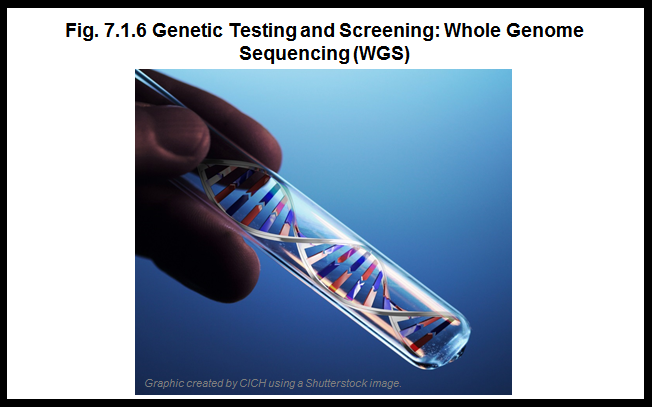Genetic Testing and Screening – Whole Genome Sequencing (WGS)

A person’s genome is his/her complete set of DNA. Each human genome contains all of the information needed to build and maintain that individual. A copy of the entire genome – which has more than 3 billion DNA base pairs – is contained in all human cells that have a nucleus.
Whole genome sequencing (WGS) compares large amounts of genetic data to identify variations in DNA associated with specific diseases. Once new genetic associations are identified, researchers can use the information to develop better strategies to detect, treat, and prevent disease.1
For a more thorough description of whole genome sequencing, click here.
1National Genome Research Institute. National Institutes of Health. http://www.genome.gov/20019523
Implications
The use of WGS in the clinic raises a number of questions. Analyzing the entire genome at once can reveal what are called “incidental” findings. Incidental findings are pieces of information learned when conducting genetic testing that do not relate to the clinical problem or concern at hand. Also, there are many genetic mutations that are not adequately understood and cannot be interpreted. This raises debates about WGS: its usefulness in the clinical setting, communicating results to families, informed consent stipulations, and the right to know or not know.
• WGS challenges current policies with regard to the genetic testing of children. Traditional guidance for genetic testing of children recommends that results revealing conditions of adult onset should not be communicated unless disclosure could prevent serious harm to the health of the child’s parents or family members.2
• WGS raises questions about potential harms, stigmatization, and discrimination. For example, the potential use of this information by insurance companies.
• The rapidly evolving volume of new information is combined presently with a lack of expertise to interpret and communicate this information. It is important that children not be caught up in the current uncertainty surrounding WGS and the communication of genetic research results and incidental findings.
2Arbour L. Guidelines for genetic testing of healthy children. A joint statement with the Canadian College of Medical Geneticists Bioethics Committee, Canadian Paediatric Society (CPS) Ethics and Public Policy Committee, Canadian College of Medical Geneticists. Paediatrics & Child Health. 2003;8(1):42–5. Reference No. B03-01. Reaffirmed January 2011. Addendum (April 2008). http://www.cps.ca/english/statements/B/b03-01.htm
